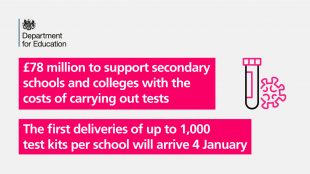£78 million in funding to support schools and colleges with mass asymptomatic testing costs

The updated publication of @EducationGovUK’s testing handbook for secondary schools and colleges on coordinating rapid testing has been published today (23 Dec) with key information on testing
What DfE are doing:
We’re offering a round of testing to all secondary schools and colleges in England to test students from the first week of term. Initially testing will be provided for all secondary pupils and staff as they return from the holidays. After the initial mass testing, all school and college staff will be able to have routine testing once a week; pupils and staff will be able to do ‘serial testing’ if one of their contacts within school tests positive. If close contacts agree to be tested each day for 7 days, and they test negative each time, they will be allowed to remain in school or college that day.
This is a phased approach, starting with secondary age settings (staff, pupils and students in schools and colleges in Year 7 and older), with plans to extend to primary schools. Students in exam year groups, vulnerable children and children of key workers will all attend school or college in person from the start of term and these groups should get the first testing slots. All pupils in primary, special and alternative provision will also return in person from the start of term. Secondary schools and colleges will operate a staggered return, offering all non-exam year groups full-time remote education, as close as possible to that which pupils would get in class, during the first week of term.
Why DfE are doing it:
Testing is important because staff, students and pupils without symptoms could still carry the virus and may spread it to many others. As many as one in three people with the virus have no symptoms. And since schools and colleges are a key part of our communities, we want to break the chains of transmission and help reduce the risk as far as possible. State-funded secondaries had an average of 24 pupils isolating per confirmed coronavirus case on 10 December – which is what we’re aiming to drastically cut down through daily testing of close contacts. This will help to deliver on our national priority of keeping education as safe as possible and open for all.
How DfE are helping schools prepare:
We recognise that we continue to ask a lot of schools and colleges in delivering rapid testing, but all teachers, staff, parents and pupils should be assured that we will be supporting them over the coming weeks.
We are allocating £78 million to support all secondary schools and colleges with testing costs. Funding will be provided to secondary schools and colleges based on their size. For example, a mainstream secondary in inner London, with 1000 pupils and staff will receive around £20k. A mainstream secondary outside London, with 2000 pupils and staff will receive around £28k.
We’ve published logistical guidance that walks secondary schools and colleges through key information they need for running testing and provides advice on setting up a safe testing site, running the testing site, staffing and resource requirements as well as processing and recording test results.
We know that every setting is different and so the guidance is flexible so that testing sites it can be adapted to accommodate other things happening in each individual school or college space.
The first deliveries of up to 1000 starter test kits, with tests and PPE, will arrive at every secondary school and college on 4 January so that they are ready to go as soon as possible, with further replenishment deliveries throughout the week.
Teachers will not be expected to administer tests. Our expectation is school and colleges will make their own decisions on how to deliver this through a mix of existing staff, agency staff and volunteers.
Regarding testing guidance and funding DfE have said:
- DfE recognise that we continue to ask a lot of schools and colleges in delivering rapid testing, but all teachers, staff, parents and pupils should be assured that we will be supporting them over the coming weeks.
- Testing is important because staff, students and pupils without symptoms could still carry the virus and may spread it to many others. And since schools and colleges are a key part of our communities, we want to break the chains of transmission and help reduce the risk as far as possible.
- DfE are also allocating £78 million in funding to support all secondary schools and colleges with testing costs incurred.
- Funding will be provided to secondary schools and colleges based on their size. For example, a mainstream secondary in inner London, with 1000 pupils and staff will receive approx. £20k. A mainstream secondary outside London, with 2000 pupils and staff will receive approx. £28k.
- They will be able to use the funding as works best for them to be able to deliver the testing. The funding will be available to cover relevant staffing costs, regardless of the number of volunteers schools use and PPE equipment will also be directly provided.
- As promised, DfE have now published further logistical guidance so those secondary schools and colleges that want to, can be ready to start testing their students from the beginning of the new term.
- This walks secondary schools and colleges through key information they need for running testing in schools and colleges and provides advice on setting up a safe testing site, running the testing site, staffing and resource requirements as well as processing and recording test results.
- DfE know that every setting is different and so the guidance is flexible so that testing sites it can be adapted to accommodate other things happening in each individual school or college space.
- The first deliveries of up to 1000 starter test kits, with tests and PPE, will arrive at every secondary school and college on 04 January so that they are ready to go as soon as possible, with further replenishment deliveries throughout the week.
Regarding previous information on testing DfE have said:
- We are offering a round of testing to all secondary schools and colleges in England to test students from the first week of January.
- The testing will help to identify the one in three who have the virus but do not have symptoms, so could be spreading the disease unknowingly.
- This will help to deliver on our national priority of keeping education as safe as possible and open for all, as well as help fight the spread of the virus.
- It builds on the incredible work schools and colleges have done to be Covid-secure throughout the autumn term, and will help to reassure students, parents and teachers about returning to school and college.
- It also follows the government’s recent announcement that every secondary school and college in England will have access to rapid testing from January. All staff in secondary schools and colleges, as well as special schools and alternative provision, will be eligible for weekly rapid tests as part of an initial rollout, and students will be eligible for daily testing if they are identified as a close contact of someone who has tested positive.
- State-funded secondaries had an average of 24 pupils isolating per confirmed coronavirus case on 10 December – which is what we’re aiming to drastically cut down through daily testing of close contacts.
- Initially testing will be provided for all secondary pupils/students and staff as they return from the holidays.
- After the initial mass testing, all school / college staff will be able to have routine testing once a week; pupils/students and staff will be able to do ‘serial testing’ if one of their contacts within school tests positive. If close contacts agree to be tested each day for 7 days, and they test negative each time, they will be allowed to remain in school/college that day. We expect that the vast majority of children will self-swab.
- This is a phased approach, starting with secondary age settings (staff, pupils and students in schools and colleges in Year 7 and older), with plans to extend to primary schools thereafter.
- Students in exam year groups, vulnerable children and children of key workers will all attend school or college in person from the start of term and these groups should get the first testing slots. All students in primary, special and alternative provision will also return to in-person tuition from the start of term.
- Secondary schools and colleges will operate a staggered return, offering all non-exam year groups full-time remote education, as close as possible to that which students would get in class, during the first week of term, with face-to-face education for all starting on 11 January.
Find out how to administer Mass asymptomatic testing in schools and colleges which will begin in January 2021:
Testing handbook
Use this handbook to prepare for rapid mass testing which will begin in January 2021. The handbook is part other training materials which will also be available to schools and colleges.
Schools and colleges testing handbook (PDF, 1.12MB, 30 pages)
Labour demands clarity around January return of schools and colleges
@UKLabour is demanding clarity from the Government around the return of schools and colleges, after news reports suggest that students may be expected to learn remotely throughout January.
Just five days after the Government published plans which would see a phased return of students to schools and colleges alongside the roll out of mass testing, the Prime Minister was unable to guarantee that plans won’t change again.
Shadow Education Secretary Kate Green and Shadow Schools Minister Wes Streeting have written to Gavin Williamson urging him to provide answers for parents, students and staff. They say urgent questions on the return of students and evidence about the spread of coronavirus among young people must be answered now “not a matter of hours or days before students and staff are due to return to the classroom”.
The letter calls on the Government to:
- Urgently publish scientific evidence on the spread of the virus in schools and colleges and the risk this poses to students, staff and wider transmission within the community, including the new strain
- Guarantee that every student will be able access learning from home, if required
- Put in place plans to safeguard vulnerable children in the event that schools and colleges close
- Involve the unions and school and college representatives in planning for the return of schools and roll out of testing
- Confirm whether plans for mass testing will go ahead
- Immediately clarify when school and college staff can expect to be vaccinated against coronavirus
 Kate Green MP, Labour’s Shadow Secretary of State for Education, said:
Kate Green MP, Labour’s Shadow Secretary of State for Education, said:
“Once again when schools, pupils and parents need certainty the Government has created chaos. The Government has lost control of the virus and children’s education is suffering as a result.
“Gavin Williamson’s late announcement on testing has created huge stress and confusion, and now the Prime Minister has said these plans published just five days ago may not happen.
“The Government must provide pupils, parents, and schools with clear information about what will happen in January and what support they will receive.”
Full text of Kate Green and Wes Streeting’s letter to Gavin Williamson (22 Dec):
Dear Gavin
News reports, prominently in The Daily Telegraph, suggest that Ministers are planning to close schools throughout January due to fears that covid-19 is spreading faster among children. The Prime Minister was equivocal in Monday’s press conference around whether schools would return in January as planned. An issue of this magnitude cannot be left to speculation and off-the-record briefings. We expect to hear clearly from you and the Prime Minister about the situation for schools and colleges and what you intend to do about it.
If schools are not able to reopen safely in January it will be a direct result of the government’s failure to get transmission under control. Labour have said time and again that school is the best place for pupils. If you and your government have failed to ensure that they can be there safely, then you must urgently ensure that there is a credible plan in place to keep them learning and safe in the weeks ahead.
The chaotic handling of plans for mass testing in schools and colleges has already raised serious questions about the impact that your dither and delay will have on their planned return in January. Parents, students and staff deserve answers now about how you intend to keep students learning and provide a safe working environment for staff.
Firstly, what does the science tell us about the spread of the virus in schools and colleges and the risk this poses to students, staff and wider transmission within the community? Will you publish the scientific advice government receives on this? The Telegraph reports concerns from government scientists that the virus is spreading faster among children. Is this correct? What evidence has the Government collected about transmission within school and college settings?
These reports understandably raise concerns about the safe return of students and staff in January. There is already a crisis of confidence in the government among school and college staff after the shambolic end to the term and the chaotic plans to roll out mass testing in January. These concerns must be addressed immediately, openly, and honestly to avoid further panic and confusion and to allow school and college leaders to plan the term ahead.
What is your plan for the return of schools and colleges in January? Can you outline the circumstances in which schools and colleges will or will not reopen at the beginning of next term? When will parents, students, and staff receive this information? When will your Department publish a credible plan for BTECs and other technical and vocational exams in January? These are urgent questions which need answers now, not a matter of hours or days before students and staff are due to return to the classroom.
Can you guarantee that every student will be able access learning from home, if required? Keeping students learning must be a priority. If scientific evidence directs that schools and colleges should revert to remote learning and teaching, you must ensure that no student is left behind. Throughout this crisis your Department’s approach to closing the digital divide to ensure that all pupils have access to suitable devices and internet access has been flat-footed and incompetent. You u-turned on cutting the laptop allocation to schools shortly before Christmas, can you now guarantee that every student learning from home has technology needed to do so? If not, why not?
What plans will the government put in place to safeguard vulnerable children? During the first lockdown, hundreds of vulnerable children did not attend school, yet the government did nothing. If learning is moved online in the new year, what plans will you put in place to safeguard vulnerable children, ensure they are attending school as required and can continue learning?
How will you involve the unions and school and college representatives in planning for the beginning of next term and the roll out of mass testing? Unions and professional organisations want the return of schools and mass testing to be a success, and the government should be using their expertise to deliver this. You must realise that these organisations are representing genuine concerns of their members, who are doing all they can to keep students learning and urgently work with them to restore trust among staff.
Is the plan for mass testing still going ahead? We have been calling on your department to introduce for mass testing in schools for months but were dismayed at the government’s late announcement last week. The stress created by this late announcement is now being compounded by the lack of clear guidance.
On Friday, Nick Gibb told the Today Programme: “the detail, operational details will be published next week as we work this through”.
Given we are now just a few days away from Christmas when can schools and colleges expect this? This must include clarity on what training will be provided to schools, what resources will be provided to deliver testing and what staffing costs will be reimbursed.
When can school and college staff expect to receive a vaccine? The Health Secretary said has suggested that the government could look to move school staff up the order for vaccination. Can you confirm whether this is the case, and when staff – beyond those already identified as clinically vulnerable – can expect to receive a vaccine?
We do not believe that you understand or appreciate the immense pressure that has faced staff, students and parents during the course of this year. Your government has added to that pressure through a combination of poor planning and incompetence. Their safety is paramount. Keeping students learning must be a national priority. We expect you to set out a plan to achieve that objective immediately.
We look forward to your response.
Shadow Education Secretary Kate Green and Shadow Schools Minister Wes Streeting
Sent by email from the Labour Party. Promoted by the Labour Party at Southside, 105 Victoria Street, London, SW1E 6QT.











Responses